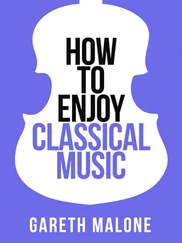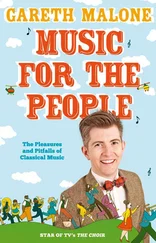STEPHEN FRY - OF CLASSICAL MUSIC
Здесь есть возможность читать онлайн «STEPHEN FRY - OF CLASSICAL MUSIC» весь текст электронной книги совершенно бесплатно (целиком полную версию без сокращений). В некоторых случаях можно слушать аудио, скачать через торрент в формате fb2 и присутствует краткое содержание. Жанр: на английском языке. Описание произведения, (предисловие) а так же отзывы посетителей доступны на портале библиотеки ЛибКат.
- Название:OF CLASSICAL MUSIC
- Автор:
- Жанр:
- Год:неизвестен
- ISBN:нет данных
- Рейтинг книги:5 / 5. Голосов: 1
-
Избранное:Добавить в избранное
- Отзывы:
-
Ваша оценка:
- 100
- 1
- 2
- 3
- 4
- 5
OF CLASSICAL MUSIC: краткое содержание, описание и аннотация
Предлагаем к чтению аннотацию, описание, краткое содержание или предисловие (зависит от того, что написал сам автор книги «OF CLASSICAL MUSIC»). Если вы не нашли необходимую информацию о книге — напишите в комментариях, мы постараемся отыскать её.
OF CLASSICAL MUSIC — читать онлайн бесплатно полную книгу (весь текст) целиком
Ниже представлен текст книги, разбитый по страницам. Система сохранения места последней прочитанной страницы, позволяет с удобством читать онлайн бесплатно книгу «OF CLASSICAL MUSIC», без необходимости каждый раз заново искать на чём Вы остановились. Поставьте закладку, и сможете в любой момент перейти на страницу, на которой закончили чтение.
Интервал:
Закладка:
Elsewhere - and as they say in some very strange places where you have to know Otto to get in - 'Bach is dead, long live the Bachs!' OK, no one actually said that. I made it up. All I mean is that 'Bach' Bach - Johann Sebastian, the big one - is dead. But there are still two other Bachs knocking around, somewhere, keeping the brand name going, as it were. Operating out of England, there's JC Bach - known accurately, if somewhat unspectacularly, as 'The English Bach', while in Germany, there's Carl Phillip Emmanuel, CPE Bach, known as… well, known as CPE Bach, actually. The English Bach is said to have visited London and loved it so much, he bought the company - that is, stayed. He became friends with Gainsborough, went to posh parties, everything. In fact while I'm about it, let me round up that list of the Bachs in full. /5 Bach - Daddy Bach JC Bach - The English Bach (youngest son of above) CPE Bach - The No Nickname Bach (second son of above) LBWBach - The Cricketing Bach © SAS Bach - The Daring Bach © TCP Bach - The Gargling Bach © NCPBach - The 'Oiyou can't park there' Bach® HSBC Bach - The Listening Bach © You see: 1763 -positively dripping with Bachs. But as for the rest of classical music, if I were to step back for a moment, to have a sort of musical 'out of body' experience, what would I see? Well, classical music as we now know it is more or less 'in'. Baroque and rococo are still around, but very 'last year' - or very 'week one', as they say in Big Brother. Going, going, gone is the 'diddle-iddle-iddle-iddle' contrapuntal stuff, and coming up now is a more pared-down sound, albeit with much more intricate forms. Of course, they didn't just happen - 'Yawn… mmm, I think I'd like to invent… a symphony' 'And so you shall!' said the Fairy Godmother, with a PING! and a whoosh - no, they sort of evolved, all Darwinesque. As the Bible would have said: Opera begat the opera overture, opera overture begat the stand-alone overture, the stand-alone overture begat the sinfonia and the sinfonia begat the symphony. After that, well, it was a bit like teams of Arctic explorers all working separately to conquer the pole - all the composers working in different camps, each tweaking a little here, or sticking an idea in there. And not just with regards to the symphony, but about all music. Music as a whole is getting go-faster stripes.
You've got a Bach in England, a Bach in Germany, a Haydn in Austria, and of course, a Gossec in Belgium.
I say, 'You've got a Gossec in Belgium!' Tell you what, nip to the top drawer of the sideboard, get yourself that pen that doesn't really work and leaves inky blotches yet you still keep putting it back in the drawer, and write down the name Gossec. Keep it handy in the kitchen, perhaps on one of those magnet sets based on Michelangelo's David. Then next time you're playing Ten Famous Belgians and you've reached Jean-Claude Van Damme and stopped, run to the fridge, memorize the name between the kitchen and the living room and coolly lob in the grenade 'Francois Joseph Gossec'. Nice.
GOT ANY GOSSEC?
F
rancois Joseph Gossec was a Walloon - what a lovely word: Waaaaalllloooonnnnn. Lovely. And even nicer when spoken like you are winding down. To be precise, Gossec was a Walloon who moved away from Antwerp, where he was a boy soprano, and went to work in France. If you were 'the Music Business' in 1763, then he was 'our man in Paris', developing, in his own special way, his symphonies, his string quartets, and all manner of other stuff. In fact, he was the first real symphony man in France, and he wrote hundreds and hundreds of different and, at the time, important works. But now? Well, now he's remembered pretty much for one work. It's not a symphony, sadly, considering that he was a bit of a pioneer in this area; it's not a string quartet. It's a piddly little piece of flute music called Tam-bourin, the favourite of novice flautists the world over, because it's not too hard and it makes them sound like James Galway for just a few minutes, instead of the soundtrack to the Clangers.
It's a tough one, this. What can you do about the fact that numerous composers have written masses and masses of great work - or at least, totally pleasant work - and yet for some reason, history has chosen, in some instances, to remember them for only one work in particular. They're often called 'one-hit wonders', but this isn't quite fair. A one-hit wonder is literally that - someone who wrote or sang one hit, and then couldn't repeat the success. As we mentioned before, Joe Dolce 'What'sa-matter-you, HEY', Renee and Renato, those guys who sang that bloody awful 'Matchstalk Men and Matchstalk Cats and Dogs'. But the classical guys, well, they did write lots of other hits. It's just that cruel fate has decided that the others won't get a look in. Having said that, at least they get one piece remembered, I guess. There are those who wrote some of the most popular pieces of their day, only to be totally erased from the history books. People like Paisiello, for example, who was massive when he was alive. Now? Well, lucky to get a rare aria included as a filler track on the latest Cecilia Bartoli album.
It's 1764. Here is the news. Buildings are going up like there's no tomorrow. Just finished last year in Paris was La Madeleine, and, this year, Adam's finest, Kenwood House in Hampstead - lovely tea rooms. Talking of all things London, the chattering classes are all abuzz about the latest wheeze - house numbers. Anyone who's anyone has got one, and, indeed, many people who aren't anyone have one too. And what a good idea they are. I mean, London has had post boxes for 120 years, now, and the 'penny post' system for over eighty years, so why not house numbers?
Actually, wait a minute, that doesn't make sense. Why did they have post boxes forty years before they had the penny post? What did they have to collect in the post boxes? Just imagine, forty years of unlocking post boxes - 'Oh, empty again… that's odd.' Still. Mine is not to reason why. Anyway, they've got house numbers now, so somewhere to stick their penny post, as it were. Next year, too, they even get pavements, so the guy delivering the mail looks more like a postman and less like Swampy the Eco-Warrior. But I digress a little. Over in America, they are just coming to grips with the taxes on the colonies and it's not looking good, if you ask me. As Foghorn Leghorn might have said, 'There's troub - ah say, there's trouble a-brewin', boy, and it's git - ah say, it's gitting worse bah the cotton pickin' minute.' Sorry. I'm OK now.
THE PRODIGY
T
he big thing in 1764, musically speaking, was the lhtle thing, as it were. The first offerings of the eight-year-old Mozart. You can just imagine him being patronized by people who didn't quite realize the genius they had in front of them. 'Awwww, little Wibbly-Wobbly Amipoopot Mozart… aww… have you got some music for the nice people… have you?… have you?… Oh, it's a full symphony, right. In, er, four movements. Good. For full orchestra. Right. Good. Well. Let's hear it then.' Then, quietiy, under their breath, 'Clever little sod.'
I don't know if you've ever heard Mozart's First Symphony, from 1764, written when he was all of eight years old. By his standards, it's quite a simple thing, certainly compared to the majesty of the 'Jupiter', the originality of the 40th and, my own personal favourite, the brown-ness-" of the 29th. And yet, despite it being simple, small even, it is perfectly formed. And it is easy to just pay lip service to the fact that it is by an eight-year-old boy. EIGHT YEARS OLD! Mums and dads, just think - that's only Year 3. If your Year 3 infant came home one day with a picture of the sky made from cottonwool, a papier-mache Hallowe'en mask and a four-movement symphony, just think how you would feel! Exactly. You'd be shocked, wouldn't you? And you'd have every right to be - making cottonwool collages of the sky is for nursery school - what the hell are they doing sending your eight-year-old home with it? And, of fi If you haven't listened to the 29th, then try and hunt down a recording. The first movement is, quite simply, brown! Gloriously brown. I don't know why, it just is. This is probably one area where I'm up there in agreement with Seriabin or Bliss -1 think certain sounds surest certain colours. Don't know how they could, but they do. And the 29th Symphony by Mozart is most definitely BROWN. Good. Just wanted to get that off my chest. course, in addition to that, you'd think, 'Jeepers, she's written a symphony!!' I'm only labouring this point because I think, to some extent, the notion of a child prodigy has lost its impact today. The Charlotte Churches, the Hayley Westernras, even, to some extent, the Ruth Lawrences - they don't mean 'child prodigy' in quite the same way that Mozart was a child prodigy. A fully scored symphony in four movements at eight years of age was even astounding then, in the eighteenth century, the very era of child prodigies. It certainly makes me put things into perspective.
Читать дальшеИнтервал:
Закладка:
Похожие книги на «OF CLASSICAL MUSIC»
Представляем Вашему вниманию похожие книги на «OF CLASSICAL MUSIC» списком для выбора. Мы отобрали схожую по названию и смыслу литературу в надежде предоставить читателям больше вариантов отыскать новые, интересные, ещё непрочитанные произведения.
Обсуждение, отзывы о книге «OF CLASSICAL MUSIC» и просто собственные мнения читателей. Оставьте ваши комментарии, напишите, что Вы думаете о произведении, его смысле или главных героях. Укажите что конкретно понравилось, а что нет, и почему Вы так считаете.










